|
After a couple of quiet days in quarters, McCarty was ordered to have the men ready to march with three days’ provisions. They marched on Thursday, January 23, to Springfield, where McCarty was able to acquire a store of new shoes, stockings, and breeches. The men, some of whom were barefoot, lined up in the snow for the desperately-needed gear. On Saturday evening, his tasks completed, McCarty once again “took a walk to the country, where I got some cyder and a very good supper.” Quartermastering had definite perquisites. Again, on Sunday, he went “into the country,” took some lodgings and “stayed all day.” On Monday, Stephen’s severely understrength brigade headed out to look for the enemy. McCarty followed behind, responsible for the wagons. “Our Virginia troops had marched, and I got orders from General Stephen to follow on, and I marched to Westfield, and then to Scotch Plains, it being in the night and very muddy. I got lodgings at one Mr. Halsey’s.” There was was a regiment of Connecticut men in the field as well, commanded by Col. Andrew Ward. These were one-year men whose enlistments would be up in May. Ward's men had been begging to go home since December, however, and were beginning to desert. McCarty and his wagons caught up with the Virginians, commanded by Col. Charles Scott, and joined them in taking quarters at Quibbletown, a village known today as New Market. McCarty, like the other Virginians, was furious that Ward’s men didn't support them. “There was a body of above 400 men that never came up to our assistance till we retreated. Then they came up, but too late, and only some.” Their anger was soon directed back at the enemy when it was discovered that some wounded Americans had been murdered on the field. Several enemy soldiers (officers, according to McCarty), “went to the field where we retreated from, and the men that was wounded in the thigh or leg, they dash out their brains with their muskets and run them through with their bayonets, made them like sieves. This was barbarity to the utmost.” The murder of the wounded Virginians is confirmed by several sources. General Stephen wrote directly to British general Sir William Erskine to complain that six Virginians “slightly wounded in the muscular parts, were murdered, and their bodies mangled, and their brains beat out, by the troops of his Britannic Majesty.” He warned that such conduct would “inspire the Americans with a hatred to Britons so inveterate and insurmountable, that they never will form an alliance, or the least connection with them.” Stephen could think of no better threat than a reprise of Gen. Edward Braddock’s defeat in the French and Indian War. Stephen used his credentials as a survivor of that battle to insult and to intimidate the British general with over-the-top threats of Indian cannibalism. I can assure you, Sir, that the savages after General Braddock’s defeat, notwithstanding the great influence of the French over them, could not be prevailed on to butcher the wounded in the manner your troops have done, until they were first made drunk. I do not know, Sir William, that your troops gave you that trouble. So far does British cruelty, now a days, surpass that of the savages. In spite of all the British agents sent amongst the different nations, we have beat the Indians into good humour, and they offer their service. It is their custom, in war, to scalp, take out the hearts, and mangle the bodies of their enemies. This is shocking to the humanity natural to the white inhabitants of America. However, if the British officers do not refrain their soldiers from glutting their cruelties with the wanton destruction of the wounded, the United States, contrary to their natural disposition, will be compelled to employ a body of ferocious savages, who can, with an unrelenting heart, eat the flesh, and drink the blood of their enemies. I well remember, that in the year 1763, Lieutenant Gordon, of the Royal Americans, and eight more of the British soldiers, were roasted alive, and eaten up by the fierce savages that now offer their services. The fundamental British strategy in the Revolution was to empower Loyalists and to pacify rebels and persuade them to accept offers of amnesty. The plan clearly wasn’t working. Shortly after the Battle of Drake’s Farm, a loyalist wrote home: “For these two month[s], or nearly, we have been boxed about in Jersey, as if we had no feelings. Our cantonments have been beaten up; our foraging parties attacked, sometimes defeated, and the forage carried off from us; all travelling between the posts hazardous; and, in short, the troops harassed beyond measure by continual duty.” The Forage War was a brilliant (and still-unheralded) success for the Americans. Denying the enemy forage and forcing them to live in close quarters for several months had a cumulatively severe impact on them. Howe had more than 31,000 troops at New York on August 27, 1776. When spring came, he had lost between forty and fifty percent of those men to death, desertion, capture, or disease. That was not sustainable. 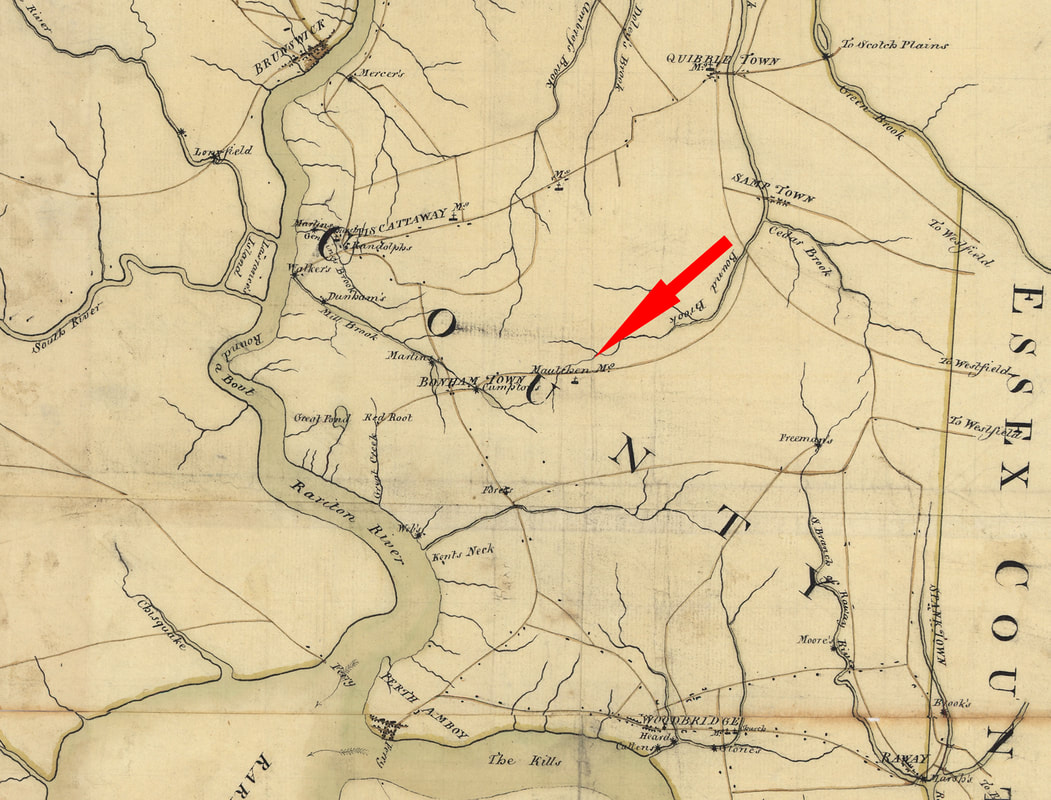 The Battle of Drake's Farm occurred at nor near Metuchen, N.J., half-way between major British outposts at New Brunswick and Perth Amboy. This 1781 map was drawn four years after the engagement. This map is oriented ninety degrees to the right of standard orientation, with the right facing to the north. (Library of Congress) More from The 8th Virginia Regiment
7 Comments
Lord de la Warr’s name appears frequently in Mr. Sterner’s story. His name was given to the Delaware River, which in turn lent its name to the Lenape people who have long been known to English speakers as the Delaware Tribe. Mr. Sterner has provided the definitive account of the worst atrocity of the Revolutionary War. In 1782 more than eighty white settlers clubbed, killed, and scalped ninety-six peaceful, Christian Indians as they prayed and sang hymns. The attack on the Moravian mission town of Gnadenhutten (Ohio) was intended as both a punitive and preemptive strike, conducted by settlers whose families and farms had been targeted by other Indians acting as proxies of the British. It is a horrific story that has defied understanding until now. ...continue to Emerging Revolutionary War Era. More from The 8th Virginia Regiment
The Old Dominion’s most influential colonial governor, William Berkeley (1642-1652 and 1660-1677) was “bitterly hostile” to religious nonconformists, especially Puritans and Quakers. A law was enacted under his leadership to “preserve the Established Church’s Unity and purity of doctrine” by punishing any dissenting minister who attempted to preach in Virginia. During the reign of William and Mary, the Toleration Act of 1688 allowed non-Catholic ministers to preach under certain conditions, a change that applied to Virginia. When the Revolution broke out nearly a century later, however, religious dissenters in the colony still hadn’t gained much beyond being tolerated.
The selection of Peter Muhlenberg as colonel of the 8th Virginia was clearly an effort to gain the support of the valley’s Germans for the cause. So too was the selection of Abraham Bowman for lieutenant colonel: he was the grandson of Jost Hite, who had led one of the first groups of German settlers to Virginia from Pennsylvania. Major Peter Helphenstine, the oldest but most junior of the three field officers, had immigrated to the valley from Germany as an adult. As residents of Woodstock, Strasburg, and Winchester, respectively, the three men also covered the geography of the heavily German lower (northern) Shenandoah Valley. Settlers in the upper (southern) Shenandoah Valley; the New and Holston river valleys of southwest Virginia; and the region around Fort Pitt in what is now southwestern Pennsylvania were also recruited for the regiment. Scotch-Irish Presbyterians predominated in these areas and were, at least by reputation, already willing to fight.
On August 16, 1775, several months before the 8th Virginia was authorized, the Third Virginia Convention adopted a resolution offered by Patrick Henry to grant the Baptists’ request to have their own military chaplains and excuse Baptist soldiers from attending Anglican services. The following summer, while the 8th was serving in the Carolinas, the Fifth Virginia Convention adopted the Virginia Declaration of Rights. This precursor to both the Declaration of Independence and the Bill of Rights proclaimed that “all men are equally entitled to the free exercise of religion, according to the dictates of conscience; and that it is the mutual duty of all to practice Christian forbearance, love, and charity toward each other.”
The Virginia Statute for Religious Freedom was drafted in 1777 by Thomas Jefferson and enacted into law in 1786, formally disestablishing the Church of England (known thereafter as the Episcopal Church). Massachusetts was the last state to disestablish its state church, a predecessor of today’s United Church of Christ, in 1833. The Virginia Statute for Religious Freedom [Drafted 1777, Enacted 1786] Whereas, Almighty God hath created the mind free; That all attempts to influence it by temporal punishments or burthens, or by civil incapacitations tend only to beget habits of hypocrisy and meanness, and therefore are a departure from the plan of the holy author of our religion, who being Lord, both of body and mind yet chose not to propagate it by coercions on either, as was in his Almighty power to do, That the impious presumption of legislators and rulers, civil as well as ecclesiastical, who, being themselves but fallible and uninspired men have assumed dominion over the faith of others, setting up their own opinions and modes of thinking as the only true and infallible, and as such endeavouring to impose them on others, hath established and maintained false religions over the greatest part of the world and through all time; That to compel a man to furnish contributions of money for the propagation of opinions, which he disbelieves is sinful and tyrannical; That even the forcing him to support this or that teacher of his own religious persuasion is depriving him of the comfortable liberty of giving his contributions to the particular pastor, whose morals he would make his pattern, and whose powers he feels most persuasive to righteousness, and is withdrawing from the Ministry those temporary rewards, which, proceeding from an approbation of their personal conduct are an additional incitement to earnest and unremitting labours for the instruction of mankind; That our civil rights have no dependence on our religious opinions any more than our opinions in physics or geometry, That therefore the proscribing any citizen as unworthy the public confidence, by laying upon him an incapacity of being called to offices of trust and emolument, unless he profess or renounce this or that religious opinion, is depriving him injuriously of those privileges and advantages, to which, in common with his fellow citizens, he has a natural right, That it tends only to corrupt the principles of that very Religion it is meant to encourage, by bribing with a monopoly of worldly honours and emoluments those who will externally profess and conform to it; That though indeed, these are criminal who do not withstand such temptation, yet neither are those innocent who lay the bait in their way; That to suffer the civil magistrate to intrude his powers into the field of opinion and to restrain the profession or propagation of principles on supposition of their ill tendency is a dangerous fallacy which at once destroys all religious liberty because he being of course judge of that tendency will make his opinions the rule of judgment and approve or condemn the sentiments of others only as they shall square with or differ from his own; That it is time enough for the rightful purposes of civil government, for its officers to interfere when principles break out into overt acts against peace and good order; And finally, that Truth is great, and will prevail if left to herself, that she is the proper and sufficient antagonist to error, and has nothing to fear from the conflict, unless by human interposition disarmed of her natural weapons free argument and debate, errors ceasing to be dangerous when it is permitted freely to contradict them: Be it enacted by General Assembly that no man shall be compelled to frequent or support any religious worship, place, or ministry whatsoever, nor shall be enforced, restrained, molested, or burthened in his body or goods, nor shall otherwise suffer on account of his religious opinions or belief, but that all men shall be free to profess, and by argument to maintain, their opinions in matters of Religion, and that the same shall in no wise diminish, enlarge or affect their civil capacities. And though we well know that this Assembly elected by the people for the ordinary purposes of Legislation only, have no power to restrain the acts of succeeding Assemblies constituted with powers equal to our own, and that therefore to declare this act irrevocable would be of no effect in law; yet we are free to declare, and do declare that the rights hereby asserted, are of the natural rights of mankind, and that if any act shall be hereafter passed to repeal the present or to narrow its operation, such act will be an infringement of natural right. More from The 8th Virginia Regiment
Philadelphia's recently defaced Tomb of the Unknown Soldier is not a memorial for George Washington (though it is located in Washington Square). It is a memorial for the two or maybe three thousand penniless soldiers who are buried there in mass graves. Each was fighting for freedom at a time when a better understanding of freedom and equality was only just dawning on humanity. The evident majority who died of smallpox suffered more than most modern people can comprehend. They died for the principle that "all men are created equal" (the Declaration of Independence, written in 1776) and so that we might have the right "peaceably to assemble" and to "petition the Government for redress of grievances" (the 1st Amendment, written in 1791). "Black lives matter" has essentially the same meaning as "all men are created equal." Both are true statements. The newer slogan, however, is also a Declaration that the "arc of history" has farther to bend until it achieves justice. That is also true. Ask any member of "Mother Emanuel" AME Church in Charleston or the families of Ahmaud Arbery and George Floyd. We have a better understanding of freedom and equality today than America's founding generation had. But you have to walk before you can run, and the men buried in Washington Square were among the very first common people on Earth to walk upright and proudly in defense of human and civil rights. Today, most of the world is still trying to catch up. We can't let up now, however. We have farther to go. Read More: "The Tragedy of Henry Laurens" (August 1, 2019) More from The 8th Virginia Regiment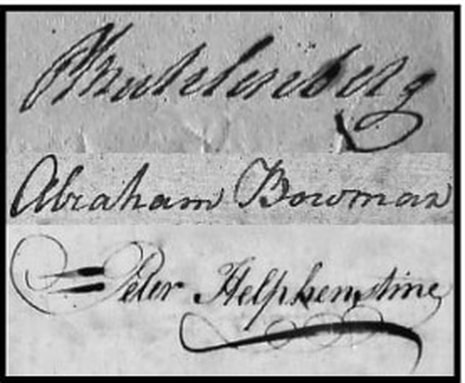 The signatures of Col. Peter Muhlenberg, Lt. Col. Abraham Bowman, and Maj. Peter Helphenstine. (Author) The signatures of Col. Peter Muhlenberg, Lt. Col. Abraham Bowman, and Maj. Peter Helphenstine. (Author) Why Germans? The 8th Virginia Regiment of Foot was authorized by the revolutionary Virginia Convention on December 13, 1775. It had no numeric designation yet, but was intended to be unique in two ways. It would be ethnically-based and all of its men would carry rifles. It was conceived as a “battalion” to “be composed of Germans, with German officers.” The concept may have originated with the Rev. Peter Muhlenberg and Jonathan Clark, both delegates from Dunmore County in the Shenandoah Valley. Dunmore (now called Shenandoah County) was the cultural hub of German life in the Valley. It is inconceivable that the resolution could have been drafted without the involvement of at least Muhlenberg and probably of Clark as well. Muhlenberg was the Rector of Beckford Parish, the geography of which was identical to that of Dunmore County. His church was at Woodstock, the county seat. He was, however, more than just the community’s pastor. He was the son of the patriarch or the Lutheran Church in America, whose church was in the village of Trappe near Philadelphia. Clark was the county’s deputy clerk, an important job, under Thomas Marshall (soon to be colonel of the 3rd Virginia Regiment and father of future Chief Justice John Marshall). The Shenandoah Valley’s Germans had nearly all come the way Muhlenberg had: down the Great Philadelphia Wagon Road to Virginia. The road passed through communities that remain heavily German to this day, such as Lancaster, Pennsylvania. Scotch-Irish immigrants followed the same route, but tended to settle farther south in the Valley, around Staunton and Augusta County. Lutheran Germans like Muhlenberg were seen by the Virginia gentry as reasonably reliable and trustworthy. Their theology differed little from the Church of England. Muhlenberg had, in fact, gone to London to be ordained before taking his position in Woodstock. (King George III was himself of German descent and his great grandfather, George I, couldn’t speak English when he took the throne.) The Ulster Irish, however, were less trusted. They were theological dissenters and often politically radical. Their Calvinist faith differed in important ways from Anglicanism. They could, however, be counted on to fight “And be it farther ordained,” read the resolution, “That of the six regiments to be levied as aforesaid, one of them shall be called a German regiment, to be made up of German and other officers and soldiers, as the committees of the several counties of Augusta, West Augusta, Berkeley, Culpeper, Dunmore, Fincastle, Frederick, and Hampshire (by which committees the several captains and subaltern officers of the said regiment are to be appointed) shall judge expedient.”
Below them, the officers of the ten companies—captains, lieutenants and ensigns—were a diverse group. English, German, and Scotch-Irish were most common. Capt. Abel Westfall of Hampshire County was Dutch, though his family had been in America for generations. Lieut. Jacob Rinker was Swiss. Lieut. Isaac Israel was Jewish. Religiously, though it is hard to trace, they were mostly Anglican, Lutheran, German Reformed, Presbyterian, and probably Baptist. If there were no Methodists, some of them—including Capt. Westfall—would become Methodists soon. ` The diversity of the officers reflected the diversity in the rank and file. The 8th Virginia was a microcosm of the Continental Army at large. It was America’s original “melting pot.” Originally divided by race and religion, their shared hardships would soon make them a band of brothers. The committees were generally dominated by English elites and could be counted on to appoint the right kind of company officers. Only two of ten companies had Irish captains: Fincastle County and the West Augusta district (both on the frontier) selected James Knox and William Croghan. Both were capable and loyal officers. The choice of field officers, however, was up to the Virginia Convention and it chose three Germans as it had planned. Each was from a different down in the lower (northern) Shenandoah Valley. Muhlenberg was appointed to be the colonel. Abraham Bowman of Strasburg (also in Dunmore County) was appointed to be the lieutenant colonel. Bowman came from a prominent family. His grandfather, Jost Hite, had led the first group of German settlers into the valley from Pennsylvania in 1731. More from The 8th Virginia Regiment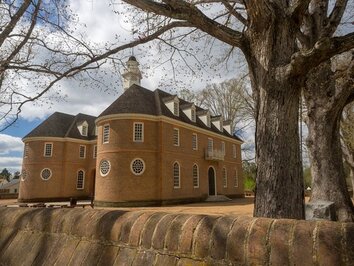 The early revolutionary Virginia Convention usually met in Williamsburg. The early revolutionary Virginia Convention usually met in Williamsburg. Virginia was described as the the "most English" of the colonies. It had been consistently loyal to the Crown, even during the era of Parliamentary rule under Oliver Cromwell. The Church of England was integrated into the local government. Virginia's frontier territories were different. When the Revolutionary War started, the Virginia Conventioned designated the 8th Virginia to be a "German" regiment. Thousands of Pennsylvania Germans had settled in the Shenandoah Valley. But how German was it really? There were also many Protestant Irish ("Scotch-Irish") and English settlers in the area, and the actual recruitment territory stretched all the way to Pittsburgh. On September 12, Gabe Neville spoke at Virginia's Germanna Foundation to explore the question: "Just how German was the regiment in reality?" Learn more at the Germanna Foundation website.
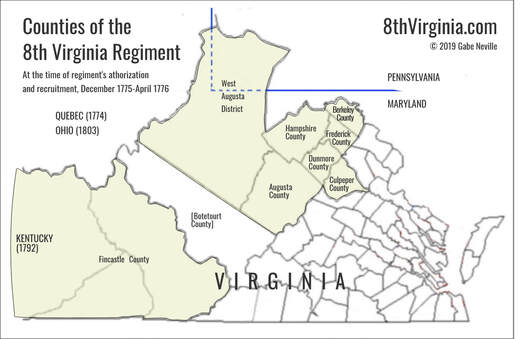 A newly-created map of the 8th Virginia's recruiting counties shows that the regiment was largely composed of frontiersmen and pioneers. It is helpful to visualize how the regiment raised its ten companies in the westernmost settled areas of the province (Virginia wasn't a state, yet). This made the regiment unique in several ways. They were ethnically and religiously different from the rest of Virginia. Soldiers, some of whom were subsistence hunters, were typically better marksmen than the average soldier. Their motives for fighting were less focused on taxes and trade and more focused on their desires to head west--something the King had forbidden. Political geography has changed. All of these counties have been divided, some within months of the regiment's formation. West Virginia, which is not shown, was created in 1863 and would occupy the left-center of the map. The disputed northeast part of the Augusta District is now southwest Pennsylvania, including Pittsburgh. Western Fincastle County became Kentucky County in 1776 and the Commonwealth of Kentucky in 1792. Most Americans are unaware that beginning in 1774, Ohio and lands west of it were part of the Province of Quebec. This, technically at least, extended holdover French civil institutions to the border of settled Virginia. Quebec had no elected legislature and had been allowed to keep its Catholic institutions. Both facts were seen by Virginians as sure signs of creeping tyranny. The Soldiers Page lists the various companies and the counties from which they came. In brief: the West Augusta District and Dunmore County each raised two companies. Augusta, Berkeley, Culpeper, Fincastle, Frederick, and Hampshire counties each contributed one. Initially called the "German Regiment" and long remembered that way, the map also shows how wide-ranging and diverse the zone of recruitment was. The lower (northern) Shenandoah Valley counties of Berkeley, Frederick, and Dunmore had significant populations and all three field officers were from that area. Culpeper, the only Piedmont county, had a smaller German population that descended from the Germanna Colony. The other counties were predominantly Scotch-Irish and English.
Could the abolition of American slavery have come sooner? Maybe. Slavery never existed in the New World without someone also speaking out against it, and antislavery views took a demonstrably large leap forward during the founding era. Christianity, social contract theory, and the very spirit of the Revolution led many Americans to the same conclusion. Even many slaveowners understood it was wrong. “I can only say,” wrote George Washington about slavery in 1786, “that there is not a man living who wishes more sincerely than I do, to see a plan adopted for the abolition of it.” Thomas Jefferson memorably condemned slavery in his first draft of the Declaration of Independence. While this language was removed by Congress, Jefferson really did want to effect a change. His concurrent draft of a Virginia constitution would have decreed, “No person hereafter coming into this country shall be held in slavery under any pretext whatever.” A decade later, he wrote that“The whole commerce between master and slave is a perpetual exercise of the most boisterous passions, the most unremitting despotism on the one part, and degrading submissions on the other. Our children see this, and learn to imitate it; for man is an imitative animal.” His concern was not just for Virginia’s children: And can the liberties of a nation be thought secure when we have removed their only firm basis, a conviction in the minds of the people that these liberties are the gift of God? That they are not to be violated but with his wrath? Indeed I tremble for my country when I reflect that God is just: that his justice cannot sleep forever: that considering numbers, nature and natural means only, a revolution of the wheel of fortune, an exchange of situation is among possible events: that it may become probable by supernatural interference! The almighty has no attribute which can take side with us in such a contest. More from The 8th Virginia Regiment
The Revolution itself was an Indian war, especially in 1779. The following Speech to the Delaware Chiefs reveals the importance of Indian relations in the war. It shows a side of Washington we rarely see--the frontiersman, surveyor, and Indian fighter who knows how to communicate with Indians by pushing the right buttons for maximum effect. When he delivered it in New Jersey, many 8th Virginia men had already finished their Continental Army service and moved to Kentucky where Indian warfare was an ever-present threat. The Delaware, many of whom were Christians, were the first Native allies of the United States. The Treaty of Fort Pitt even held out the prospect of representation in Congress as a 14th state, but by 1779 the relationship was already starting to weaken. The Oneida and Tuscarora tribes, both part of the Iroquois Confederacy, also allied with the Americans in the war. Head Quarters, Middle Brook, May 12, 1779. Brothers: I am happy to see you here. I am glad the long Journey you have made, has done you no harm; and that you are in good health: I am glad also you left All our friends of the Delaware Nation well. Brothers: I have read your paper. The things you have said are weighty things, and I have considered them well. The Delaware Nation have shown their good will to the United States. They have done wisely and I hope they will never repent. I rejoice in the new assurances you give of their friendship. The things you now offer to do to brighten the chain, prove your sincerity. I am sure Congress will run to meet you, and will do every thing in their power to make the friendship between the people of these States, and their Brethren of the Delaware nation, last forever. Brothers: I am a Warrior. My words are few and plain; but I will make good what I say. 'Tis my business to destroy all the Enemies of these States and to protect their friends. You have seen how we have withstood the English for four years; and how their great Armies have dwindled away and come to very little; and how what remains of them in this part of our great Country, are glad to stay upon Two or three little Islands, where the Waters and their Ships hinder us from going to destroy them. The English, Brothers, are a boasting people. They talk of doing a great deal; but they do very little. They fly away on their Ships from one part of our Country to an other; but as soon as our Warriors get together they leave it and go to some other part. They took Boston and Philadelphia, two of our greatest Towns; but when they saw our Warriors in a great body ready to fall upon them, they were forced to leave them. Brothers: We have till lately fought the English all alone. Now the Great King of France is become our Good Brother and Ally. He has taken up the Hatchet with us, and we have sworn never to bury it, till we have punished the English and made them sorry for All the wicked things they had in their Hearts to do against these States. And there are other Great Kings and Nations on the other side of the big Waters, who love us and wish us well, and will not suffer the English to hurt us. Brothers: Listen well to what I tell you and let it sink deep into your Hearts. We love our friends, and will be faithful to them, as long as they will be faithful to us. We are sure our Good brothers the Delawares will always be so. But we have sworn to take vengeance on our Enemies, and on false friends. The other day, a handful of our young men destroyed the settlement of the Onondagas. They burnt down all their Houses, destroyed their grain and Horses and Cattle, took their Arms away, killed several of their Warriors and brought off many prisoners and obliged the rest to fly into the woods. This is but the beginning of the troubles which those Nations, who have taken up the Hatchet against us, will feel. Brothers: I am sorry to hear that you have suffered for want of necessaries, or that any of our people have not dealt justly by you. But as you are going to Congress, which is the great Council of the Nation and hold all things in their hands, I shall say nothing about the supplies you ask. I hope you will receive satisfaction from them. I assure you, I will do every thing in my power to prevent your receiving any further injuries, and will give the strictest orders for this purpose. I will severely punish any that shall break them. Brothers: I am glad you have brought three of the Children of your principal Chiefs to be educated with us. I am sure Congress will open the Arms of love to them, and will look upon them as their own Children, and will have them educated accordingly. This is a great mark of your confidence and of your desire to preserve the friendship between the Two Nations to the end of time, and to become One people with your Brethen of the United States. My ears hear with pleasure the other matters you mention. Congress will be glad to hear them too. You do well to wish to learn our arts and ways of life, and above all, the religion of Jesus Christ. These will make you a greater and happier people than you are. Congress will do every thing they can to assist you in this wise intention; and to tie the knot of friendship and union so fast, that nothing shall ever be able to loose it. Brothers: There are some matters about which I do not open my Lips, because they belong to Congress, and not to us warriors; you are going to them, they will tell you all you wish to know. Brothers: When you have seen all you want to see, I will then wish you a good Journey to Philadelphia. I hope you may find there every thing your hearts can wish, that when you return home you may be able to tell your Nation good things of us. And I pray God he may make your Nation wise and Strong, that they may always see their own true interest and have courage to walk in the right path; and that they never may be deceived by lies to do any thing against the people of these States, who are their Brothers and ought always to be one people with them. (Updated May 21, 2024) More from The 8th Virginia Regiment
This vast territory can be characterized in two important ways. First, as the frontier. Second, and just as important at the time, the territory can be described as the part of Virginia populated by newcomers. Most of them had come inland via Pennsylvania and were neither English nor Anglican. Culturally, the Irish and German men of the regiment had more in common with Pennsylvania than with Piedmont or Tidewater Virginia. Those parts of Virginia--"Old Virginia" or "Tuckahoe Virginia" -- were very homogeneous. Most "nonconforming" churches were barely tolerated in most of Virginia but fared better west of the Blue Ridge. Still, Lutheran-trained Peter Muhlenberg had to go to London to be ordained in the Church of England in order to serve as Beckford Parish rector in Woodstock as late as 1772. Four years later he became the regiment's first colonel. In describing the 8th Virginia as the "German Regiment" and appointing German field officers to lead it, the Virginia Convention was making an effort to make sure the colony was united. At the same time, they were blocking Presbyterian Scotch-Irish from holding senior commands. Winchester's Daniel Morgan is the most prominent hero of the Shenandoah Valley, and he is rightly famous. However, other than the 1775-1776 rifle company he led as a captain, the military organizations he led were not true Shenandoah Valley units the way 8th was. In 1776 and 1777 he was colonel of the 11th Virginia, which recruited from Frederick County but also from Prince William, Amelia, and Loudoun counties; his famous Virginia rifle battalion, formed in 1777, was built on merit, not geography. As a general, he led men from even more places. The 8th Virginia truly represented the geography and the culture of the Shenandoah Valley. (Updated April 26, 2020 and May 9, 2024) More from The 8th Virginia Regiment |
Gabriel Nevilleis researching the history of the Revolutionary War's 8th Virginia Regiment. Its ten companies formed near the frontier, from the Cumberland Gap to Pittsburgh. Categories
All
Archives
June 2024
© 2015-2022 Gabriel Neville
|
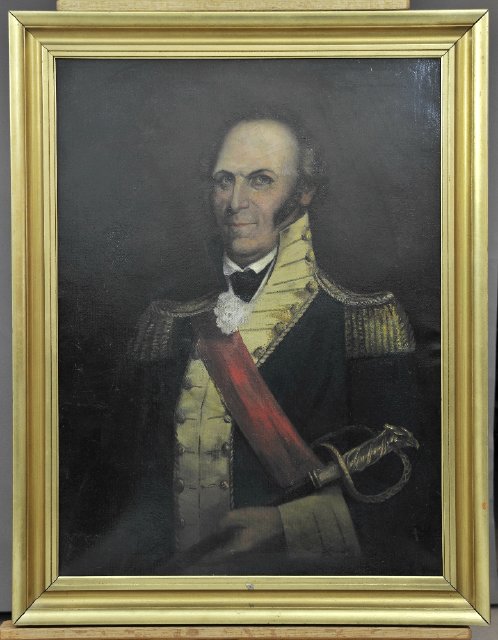
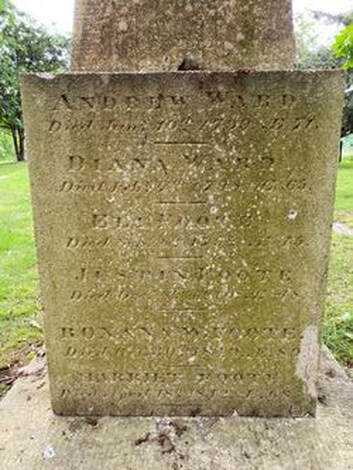
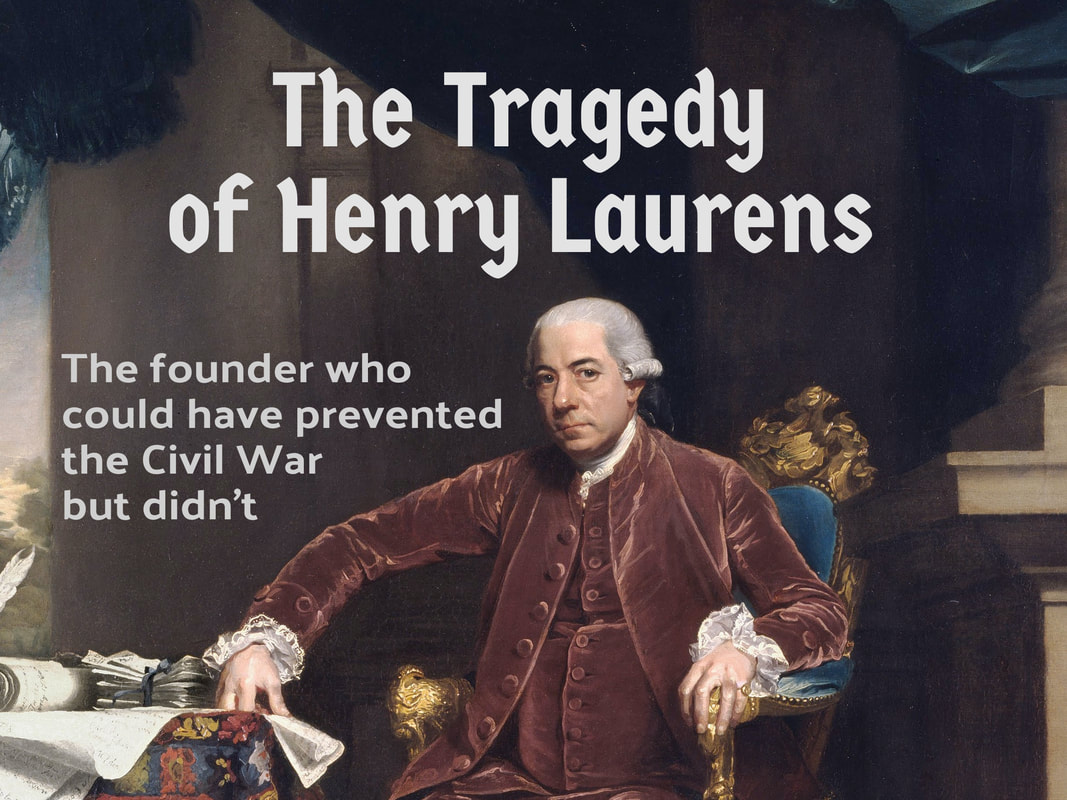
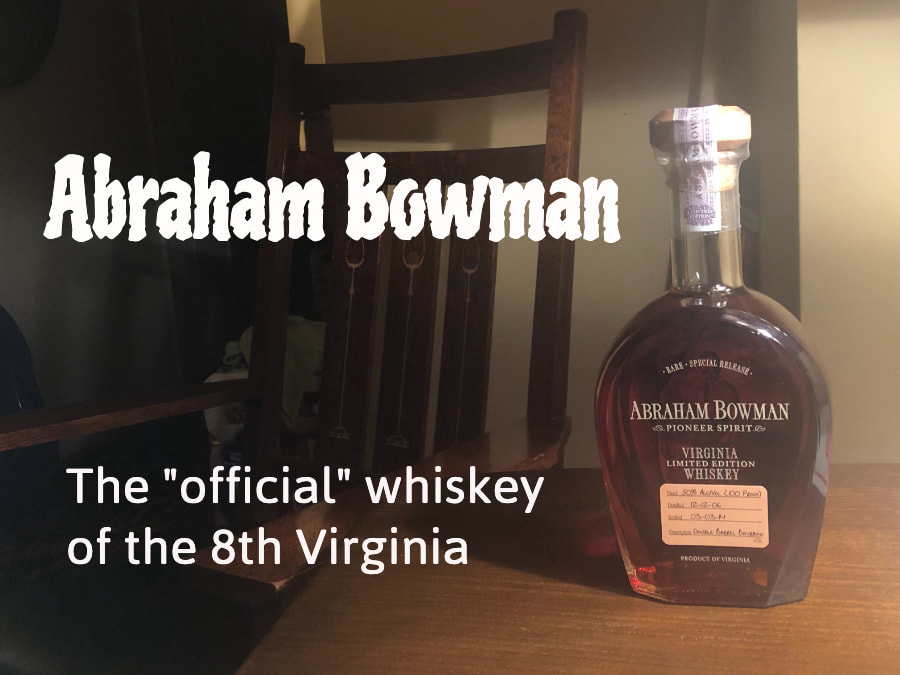
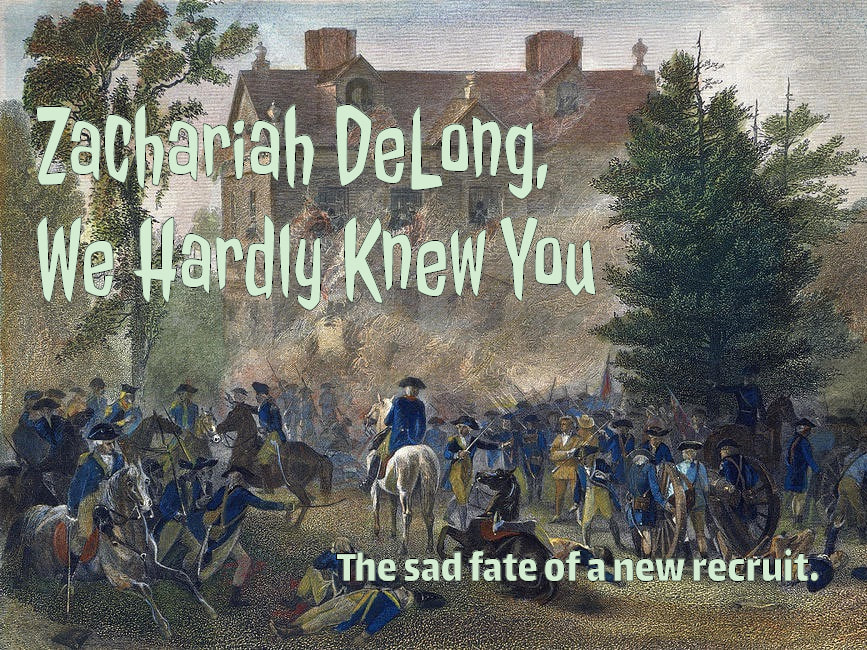

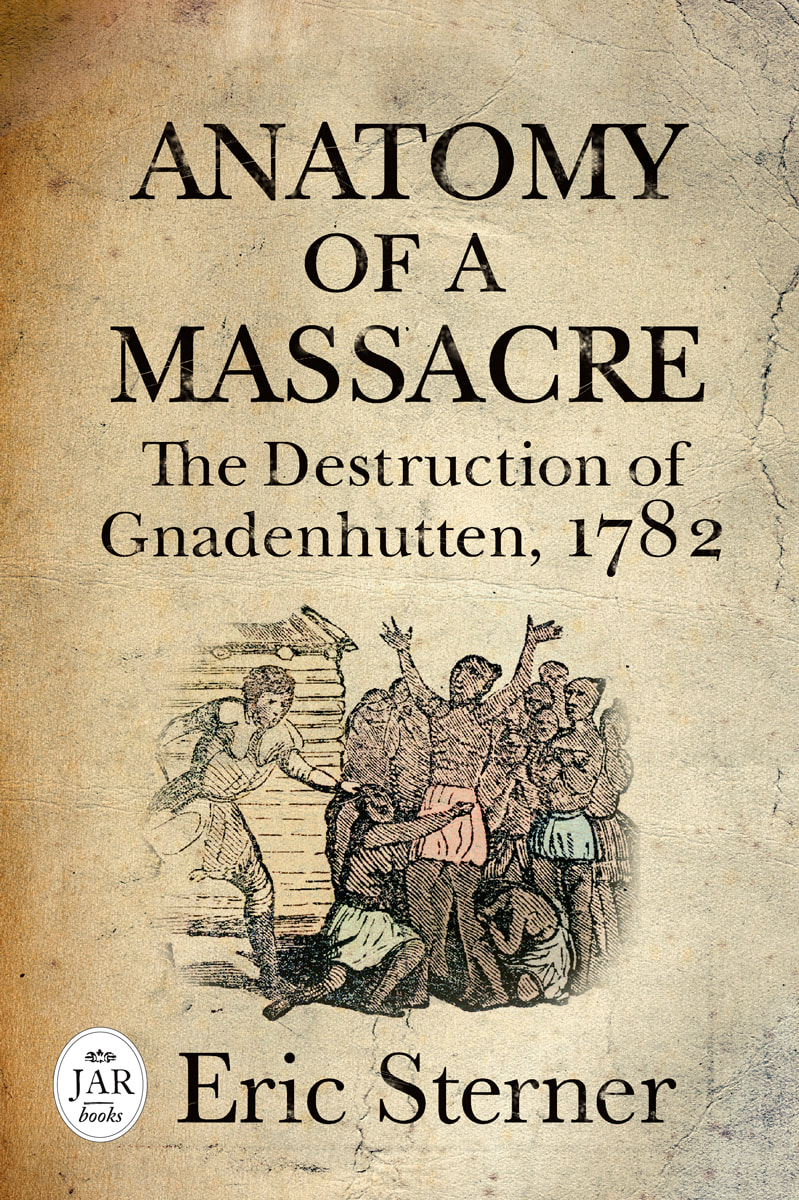
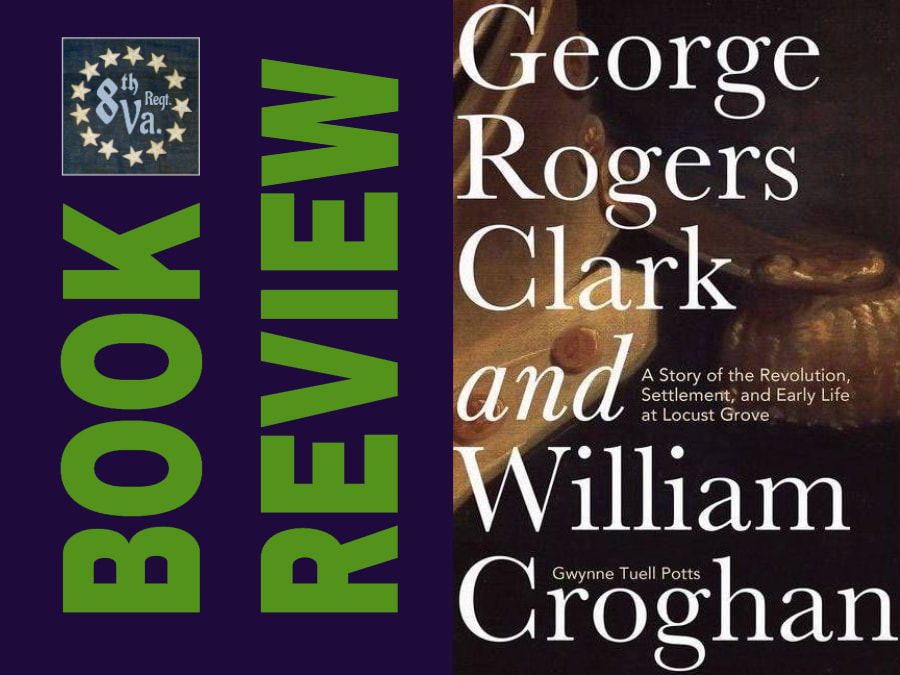
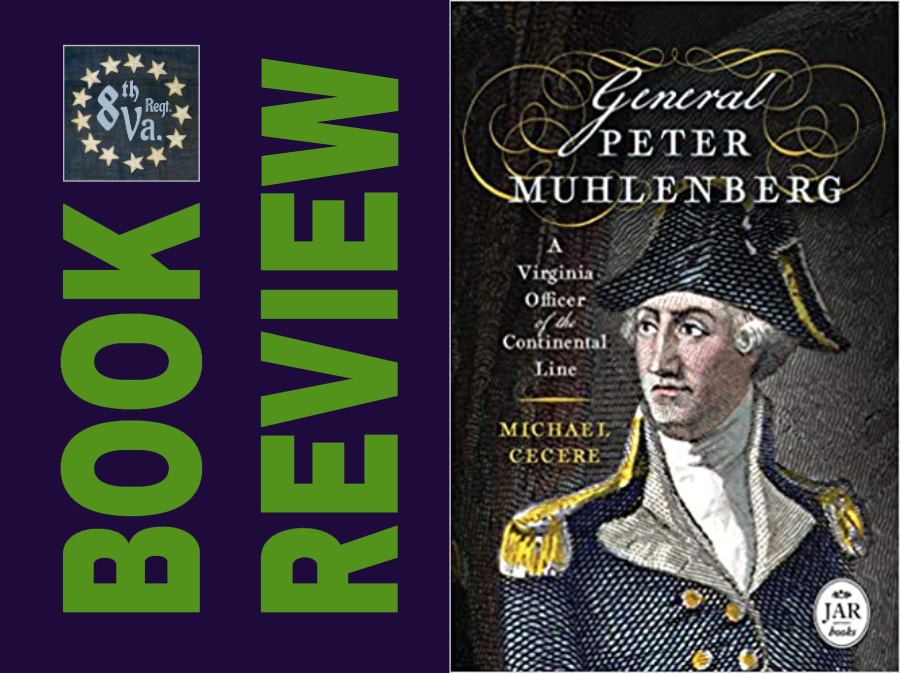
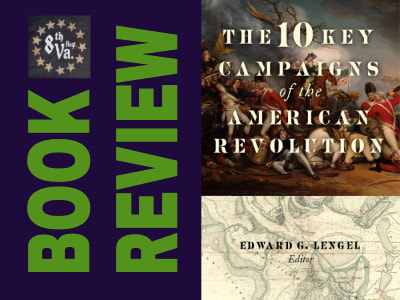
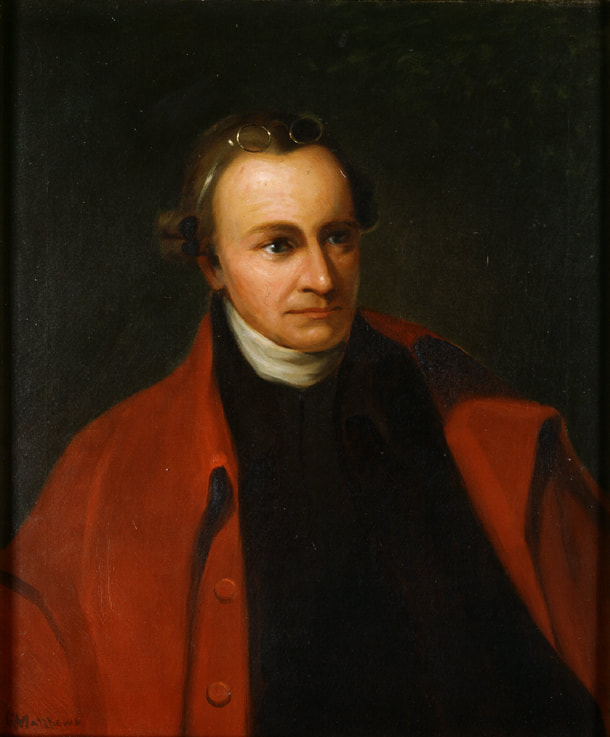
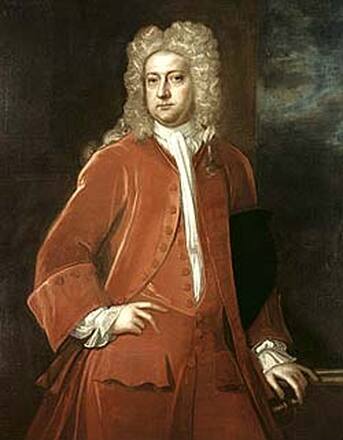
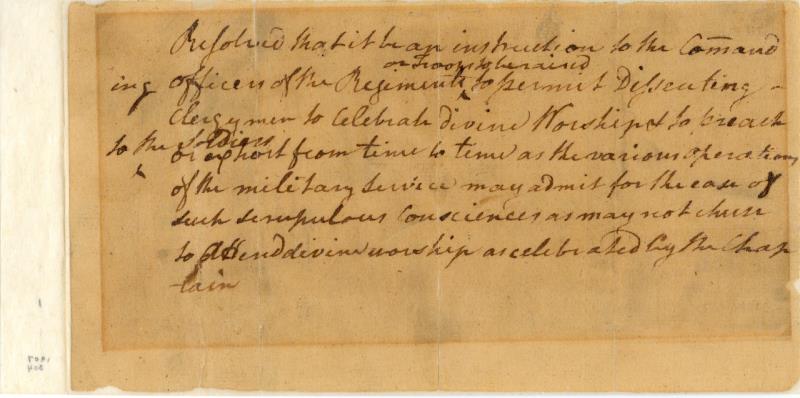
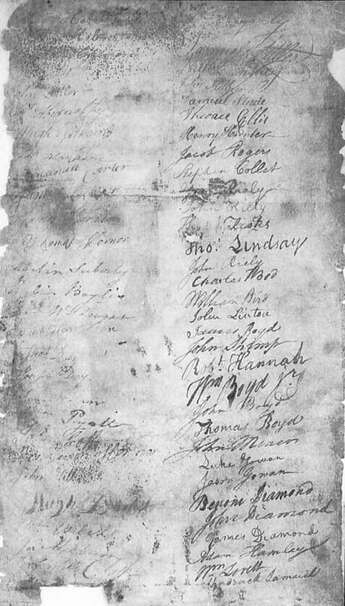
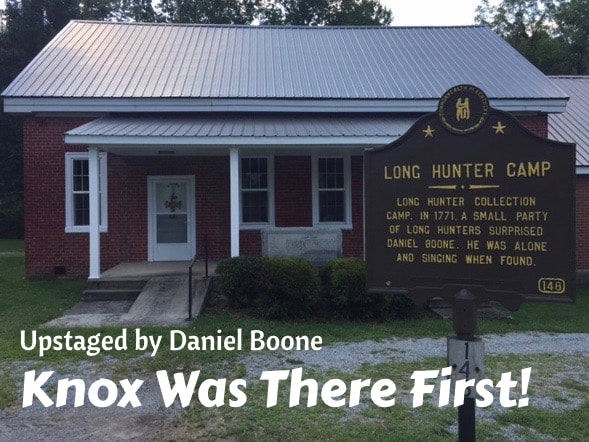
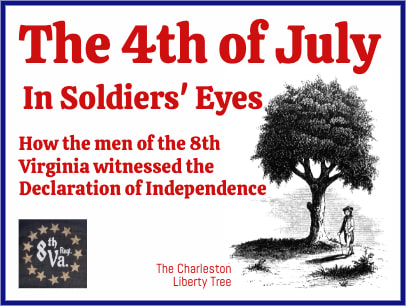
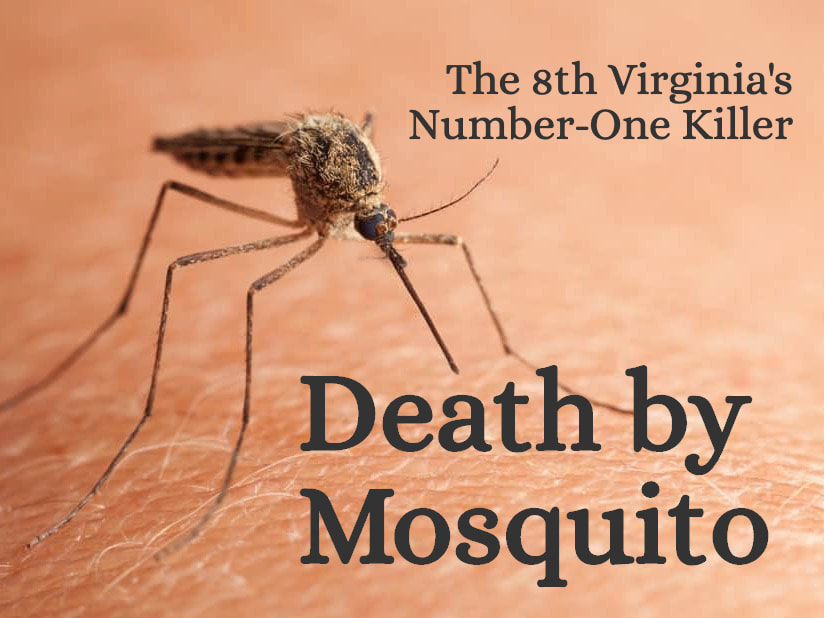
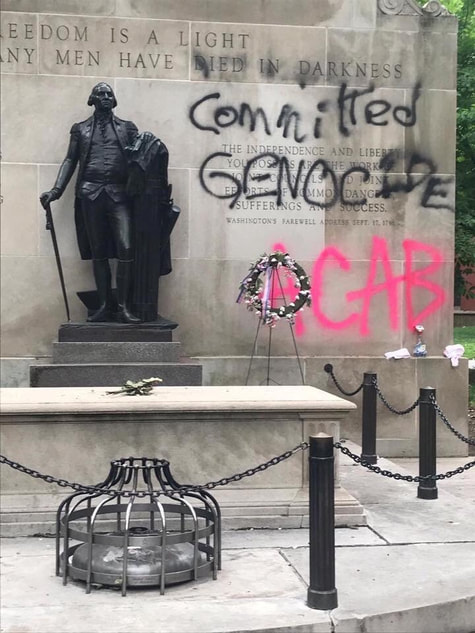

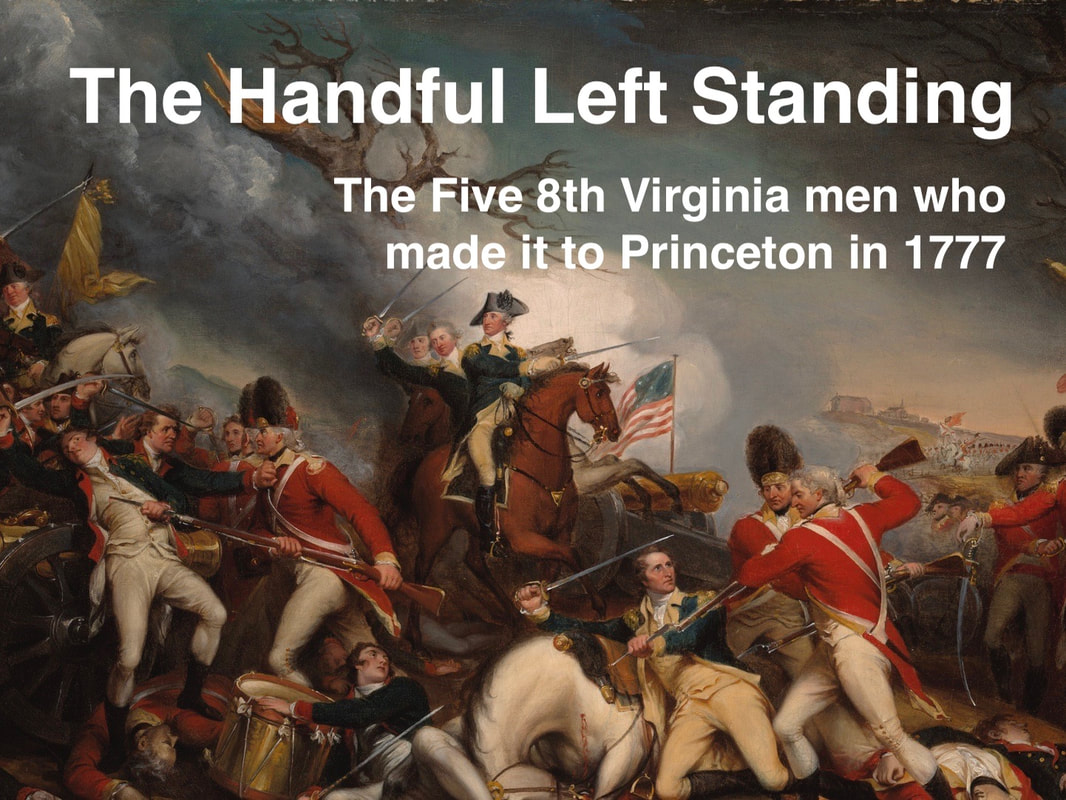
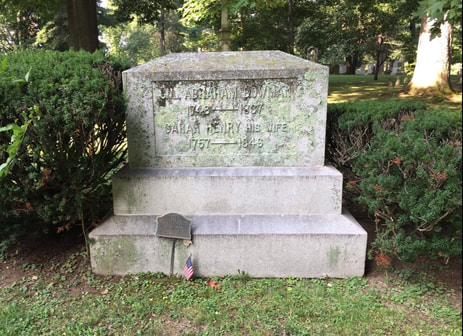
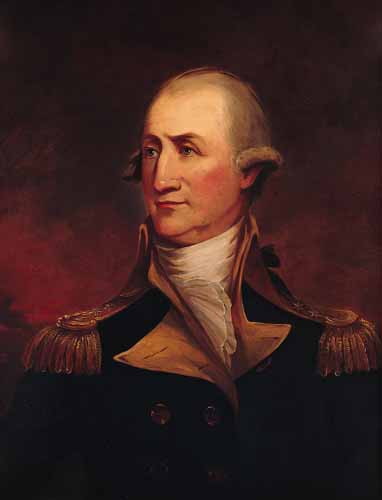
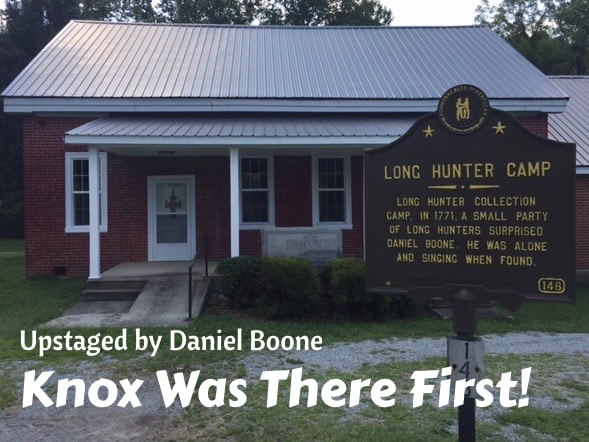

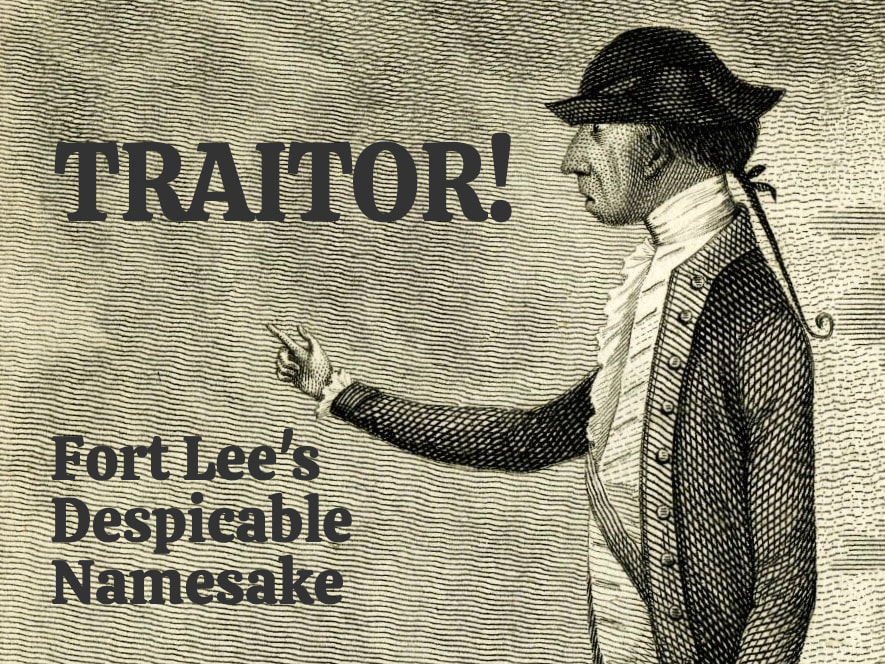
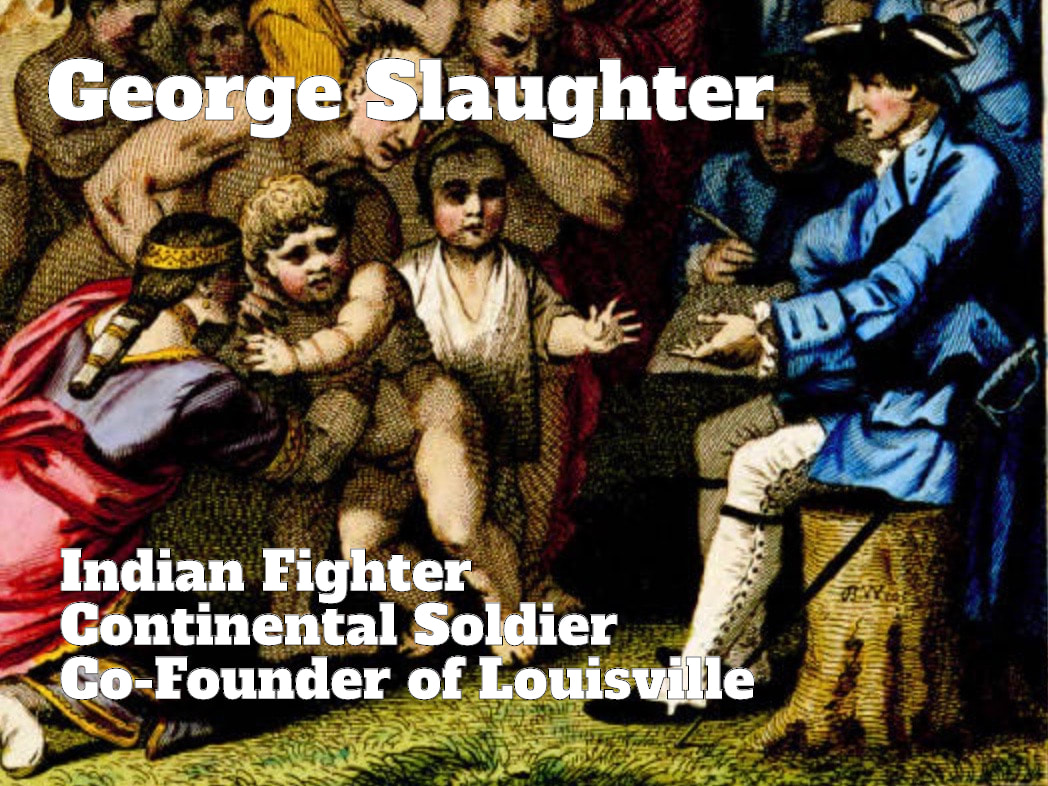
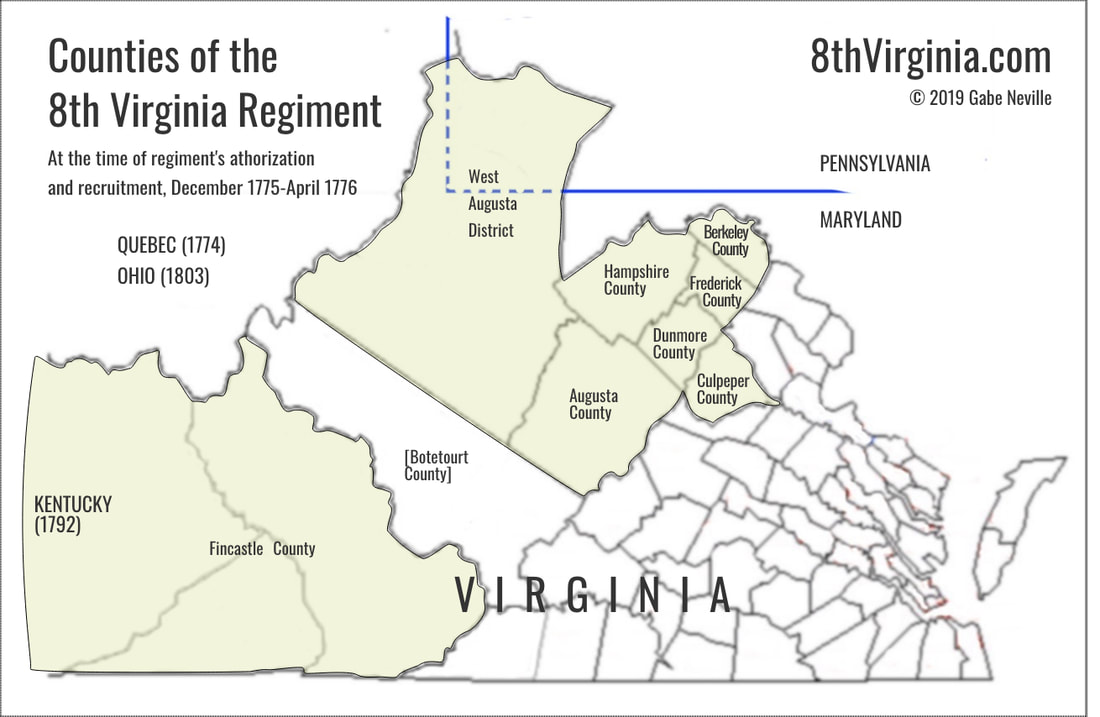
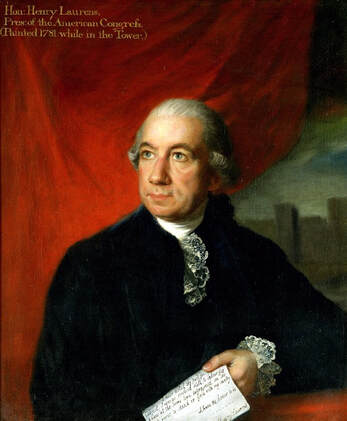

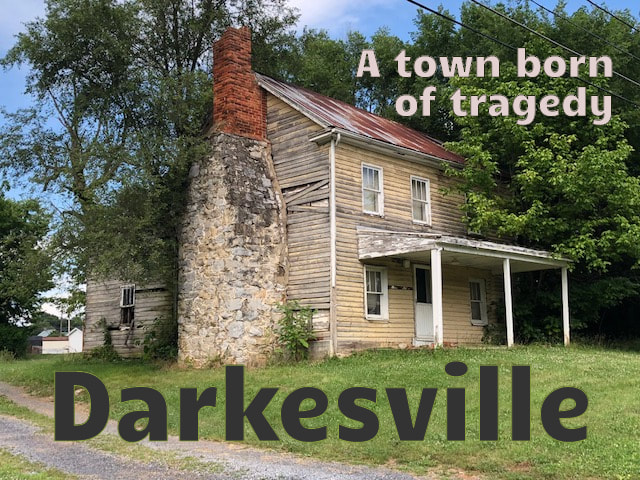
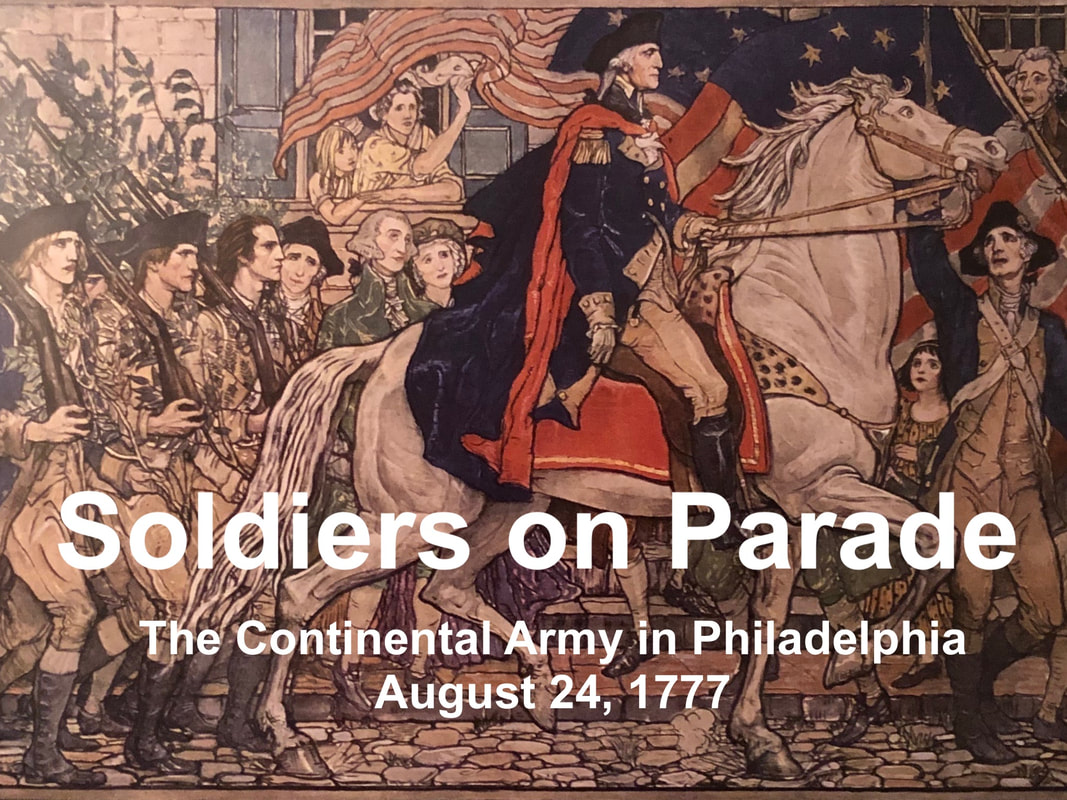
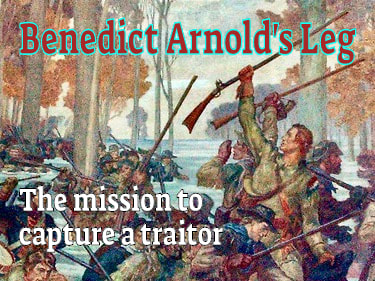

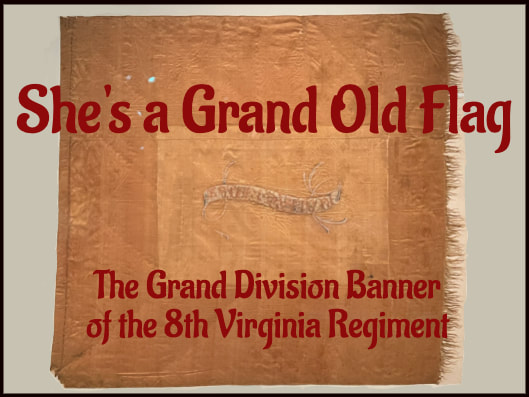
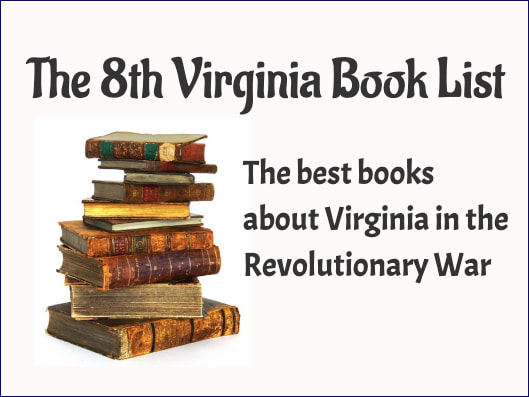

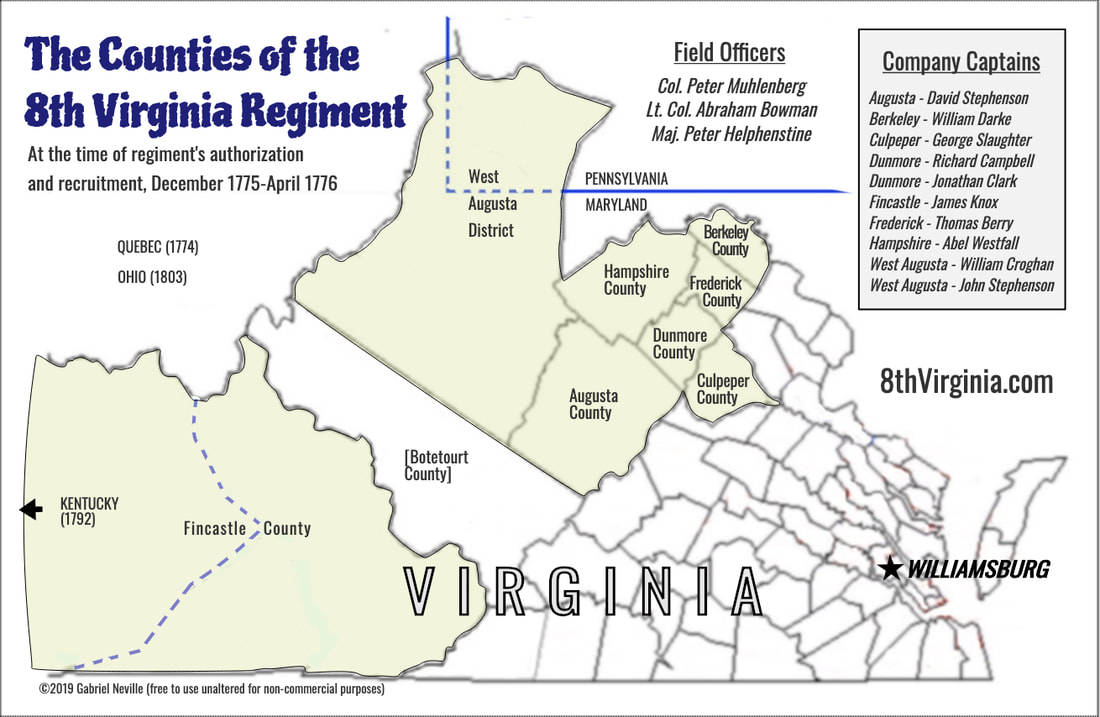
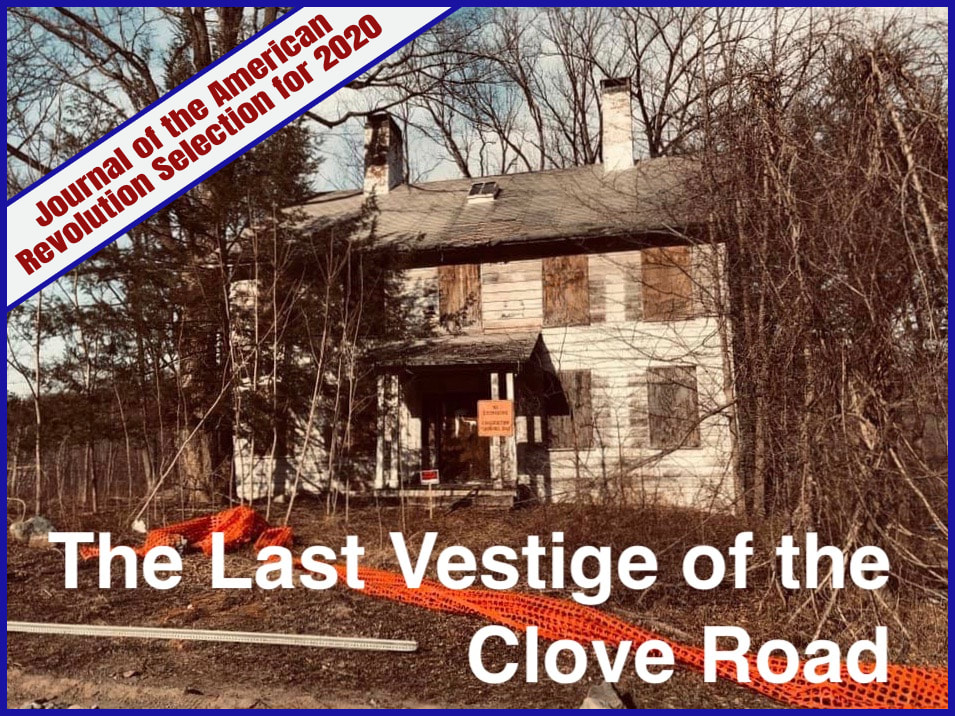
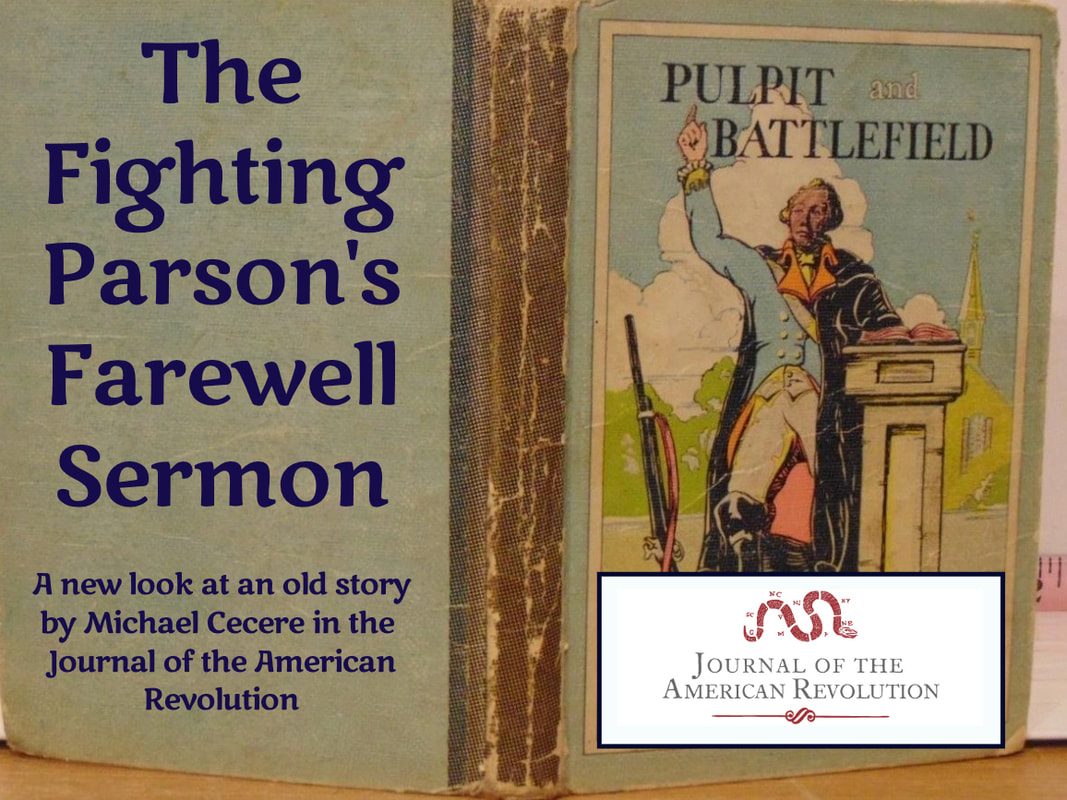
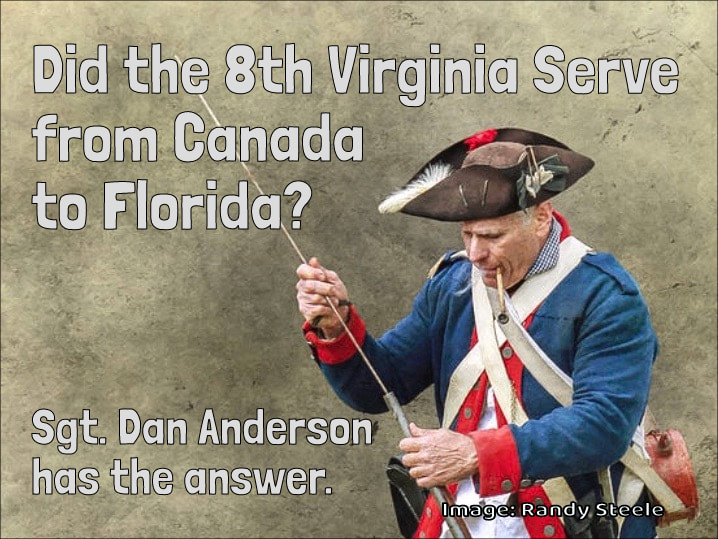
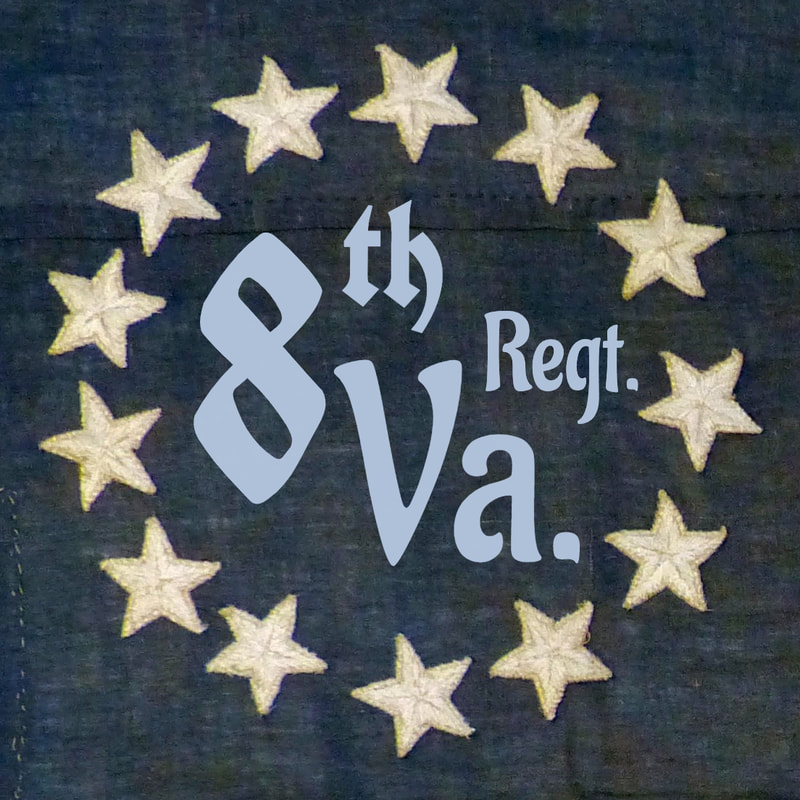
 RSS Feed
RSS Feed